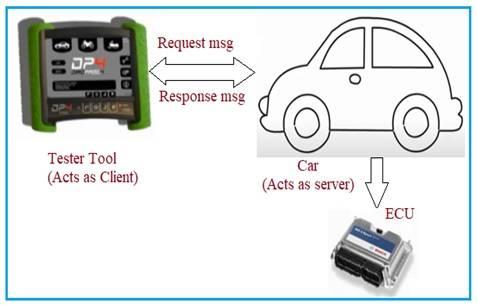UDS Protocol: 5 Advantages and Disadvantages
Advertisement
This article discusses the advantages and disadvantages of the UDS (Unified Diagnostic Services) protocol, providing a basic overview of its functionality.
What is UDS Protocol?
Introduction:
Embedded electronic systems are now commonplace in the automotive industry, with various car manufacturers utilizing them extensively. The UDS protocol was developed to allow a single tester diagnostic tool to track and control various parameters across different car models. This is achieved by implementing the UDS protocol on ECUs (Electronic Control Units) within vehicles. The Unified Diagnostic Services (UDS) protocol is a standardized and powerful framework for vehicle diagnostics, offering extensive functionalities for fault detection, ECU programming, and system monitoring.
The UDS protocol facilitates communication between testers and ECUs using standards like KWP 2000, CAN, LIN, and Ethernet. UDS protocol specifications are defined in ISO 14229 and managed by SAE. All tier-1 OEMs (Original Equipment Manufacturers) incorporate UDS in their ECU designs.

In the UDS architecture, the tester functions as a client, while the ECU acts as a server. The tester sends service request messages to the ECU to perform various tasks, including:
- Requesting data for fault diagnostics
- Writing data for sensor calibration
- Programming ECUs
- Retrieving results
- Running tests
- Clearing memory
Benefits or Advantages of UDS Protocol
Here are the benefits of using UDS Protocol:
- Universal Testing: Enables testing of ECUs from different car manufacturers (e.g., Ford, BMW, Toyota, Volkswagen, Renault, Maruti Suzuki) using a single tester tool.
- Improved Efficiency: Offers better efficiency during data exchange compared to KWP 2000. A UDS compliant tester tool can request multiple measurements using a single UDS service request frame. UDS protocol uses 2 bytes of data identifier where as KWP 2000 uses 1 byte.
- Multi-Interface Support: Works on multiple interfaces such as Ethernet, LIN, CAN, FlexRay, K-Line, KWP 2000, etc.
- Unified Diagnostics: The UDS protocol stack is a unified diagnostics protocol. This allows for easy integration with ACUs (Automotive Control Units) regardless of hardware or software specifications.
- Flow Control: UDS utilizes a flow control mechanism to transmit data exceeding a single frame.
- Security: The protocol includes security access services to prevent unauthorized access to critical vehicle systems. Challenge response authentication methods ensure that only authorized users can modify ECU settings.
- Enhanced Vehicle Safety and Performance Monitoring: By allowing real time monitoring and control of vehicle components, UDS helps in predictive maintenance, reducing unexpected failures.
Drawbacks or Disadvantages of UDS Protocol
The limitations of using UDS Protocol include:
- Complexity: Due to the extensive set of services, integrating UDS into an automotive system requires significant development effort and expertise.
- Processing & Memory: UDS communication requires additional processing power and memory in ECUs, making it challenging for low end microcontrollers or legacy systems.
- Offline Diagnostics: Primarily designed for offline diagnostics of vehicle malfunctions at service stations. UDS protocol must be implemented on both the vehicle’s ECUs and the tester tool.
- Not for Onboard Self-Diagnosis: Unlike OBD (On-Board Diagnostics), which is used for self diagnosis services of ECUs, UDS is geared towards external, service based diagnostics.
- Safety application: UDS operates on a request-response model, which may introduce latency in real time safety critical systems like braking or airbag control. The real time constraints in safety critical applications may require careful optimization.
Conclusion
Despite its challenges, the UDS protocol remains a vital part of modern automotive diagnostics due to its extensive capabilities, standardization and ability to support ECU updates and security mechanisms. While its implementation requires careful consideration of system resources, network bandwidth and security, the benefits it offers in terms of vehicle maintenance, safety, and performance monitoring make it an indispensable tool in the automotive industry.
Advertisement
 RF
RF

